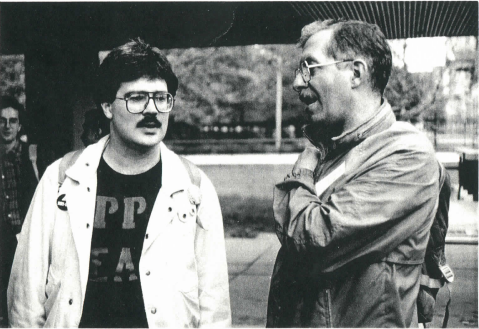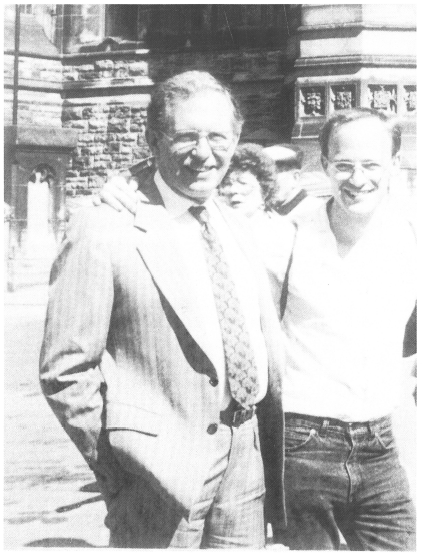This feature remembers and celebrates the work of George W. Smith (1935-1994), whose political, theoretical, and practical insights have been foundational to our work at the AIDS Activist History Project.

- Gary Kinsman (left) and George Smith (right) at an AIDS ACTION NOW! demonstration at Toronto City Hall, May 1988.
Political Activist. Researcher. Writer. Educator. Colleague. Friend.
George W. Smith was active in gay liberation and AIDS organizing in the late 1980s and early 1990s, up until his death from AIDS-related complications in 1994. George was a founding member of Toronto’s AIDS ACTION NOW!, an activist group committed to extending the lives of people living with HIV/AIDS (PLWAs), improving their quality of life through access to treatment, and ensuring that HIV/AIDS became a manageable, though chronic, condition. To learn more about George’s work with AIDS ACTION NOW!, click here.
At the AIDS Activist History Project (AAHP), we think about George in every aspect of our work. When we began this project in 2015, we set out to learn about the history of AIDS activism in Canada from the perspective of those directly involved in the movement. Our intention was not to write the comprehensive history of AIDS activism, but rather to remember the important work of AIDS activists, and to present diverse accounts of political organizing against government and medical inaction.
This orientation to research has been informed by George’s work on political activist ethnography (PAE), a method of sociological research that considers activism a crucial ethnographic resource, rich with pedagogical and theoretical significance. As George teaches us in his influential article, “Political Activist as Ethnographer,” the role of researcher in PAE is not to explain movements from a distance, or academically, but rather to engage in an analysis that will help determine more effective strategies for activism (1990: 87). George’s work on PAE extends and reformulates Dorothy E. Smith’s work on institutional ethnography (IE), with whom George worked closely at the Ontario Institute for Studies in Education (OISE). To learn more about George’s work on IE and PAE, click here.
During our interviews, many activists referenced “documents and demonstrations,” a phrase that George often used when theorizing political activism and social change. As members of AIDS ACTION NOW! recall, for George, this conceptual framework was central to understanding the relationship between research and practice, and thus also central to the work of making change. To learn more about George’s formulation of the importance of having both “documents and demonstrations,” click here.
Among George’s contributions to research on the social organization HIV/AIDS is a report titled “Hooking Up to Social Services,” which he co-published with Eric Mykhalovskiy. Based on research conducted between 1990 and 1993, the “Hooking Up” report brought attention to the many barriers that people living with HIV/AIDS faced when seeking access to basic social services. To learn more about the research process and findings from the “Hooking Up” report, click here.
Part of George’s activism also included engaging popular education to help shift the broader conversation around HIV/AIDS. While he indeed made important scholarly interventions into the social organization of HIV/AIDS, he was also actively publishing popular education pieces in Rites Magazine and AIDS ACTION NEWS! To learn more about George’s popular journalism and education work, click here.
George played a key role in AIDS ACTION NOW!’s Treatment Information Exchange (TIE) project. Later known as the Canadian AIDS Treatment Information Exchange (CATIE), the TIE Project was focused on mobilizing meaningful and accessible knowledge around the latest treatments for people living with HIV/AIDS. To learn more about George’s work with TIE & CATIE, click here.

To continue exploring the life and legacy of George W. Smith, please see below:
- George W. Smith Reading List (compiled by members of the AAHP)
- George W. Smith Quotations (compiled by members of the AAHP)
- Memories of George W. Smith (as remembered by activists interviewed for the AAHP)
- Obituary for George W. Smith (published by The Toronto Star)
Sarah Rodimon is Project Manager for the AIDS Activist History Project, and has recently completed her PhD in the Department of Sociology & Anthropology and the Institute of Political Economy at Carleton University. Her research uses Political Activist Ethnography (PAE) to explore how reproductive justice activists are affecting change at the provincial level by pushing back against the control, regulation and stigmatization of abortion in New Brunswick and across Canada. Following the methodological insights of Dorothy Smith and George Smith, she begins her inquiry from the standpoint of activists to explore how abortion care is coordinated by the everyday work of people within institutional and administrative regimes.
We thank past researchers involved in this project – especially Janna Klostermann, Chris Hurl, and Blake MacMillan – for their work collecting and organizing the material that has made this feature possible.